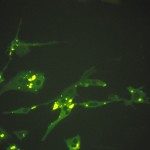Link to Pubmed [PMID] – 22072723
Clin. Vaccine Immunol. 2012 Jan;19(1):5-10
Rift Valley fever (RVF) is an emerging zoonosis in Africa which has spread to Egypt, the Arabian Peninsula, Madagascar, and Comoros. RVF virus (RVFV) (Bunyaviridae family, Phlebovirus genus) causes a wide range of symptoms in humans, from benign fever to fatal hemorrhagic fever. Ruminants are severely affected by the disease, which leads to a high rate of mortality in young animals and to abortions and teratogenesis in pregnant females. Diagnostic tests include virus isolation and genome or antibody detection. During RVFV infection, the nucleoprotein encapsidating the tripartite RNA genome is expressed in large amounts and raises a robust antibody response, while the envelope glycoproteins elicit neutralizing antibodies which play a major role in protection. Much less is known about the antigenicity/immunogenicity of the nonstructural protein NSs, which is a major virulence factor. Here we have developed a competitive enzyme-linked immunosorbent assay (ELISA) enabling detection of low levels of NSs-specific antibodies in naturally infected or vaccinated ruminants. Detection of the NSs antibodies was validated by Western blotting. Altogether, our data showed that the NSs antibodies were detected in only 55% of animals naturally infected by RVFV, indicating that NSs does not induce a consistently high immune response. These results are discussed in light of differentiation between infected and vaccinated animals (DIVA) tests distinguishing naturally infected animals and those vaccinated with NSs-defective vaccines.

